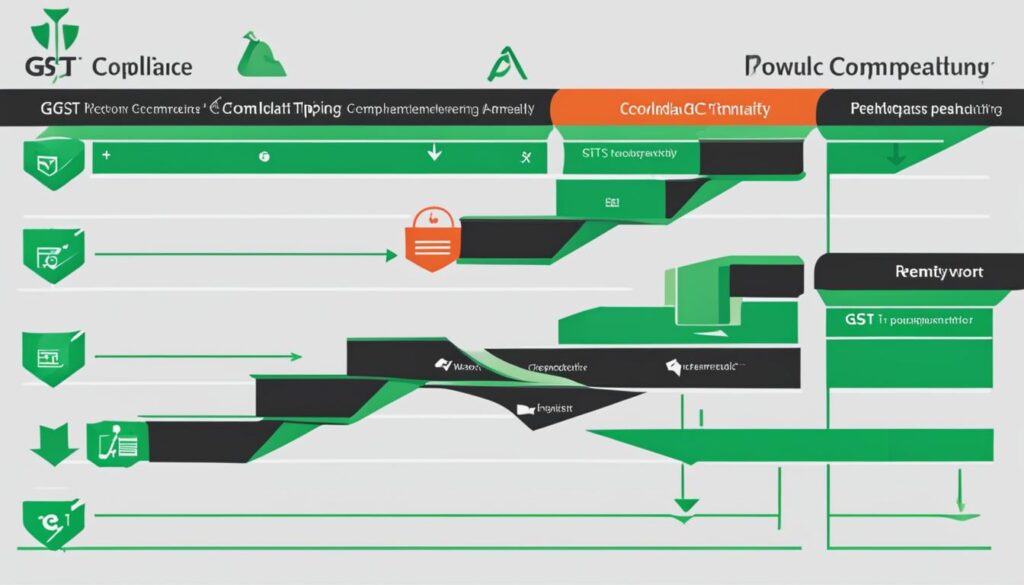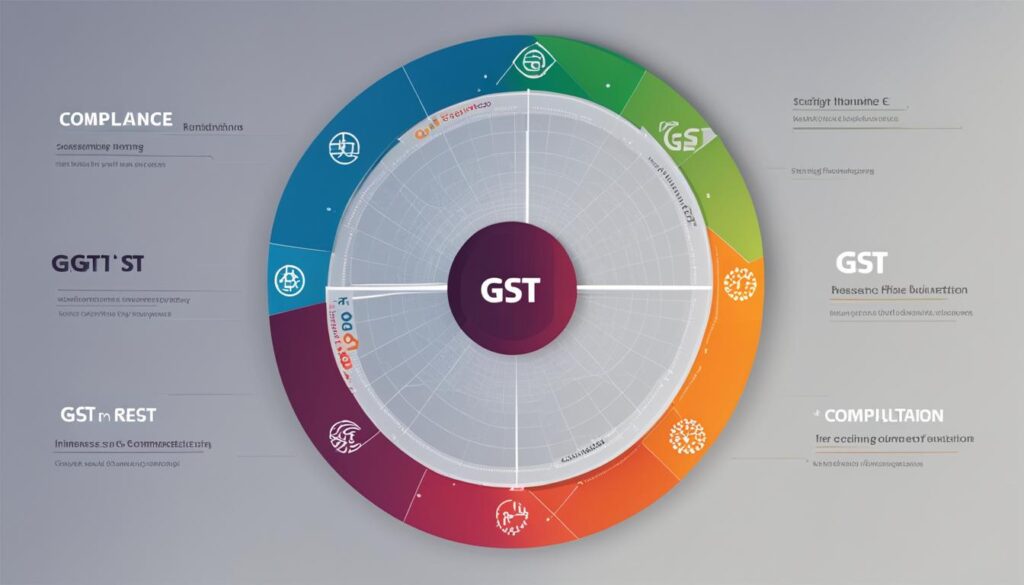In today’s business landscape, understanding the intricacies of Goods and Service Tax (GST) regulations is crucial for maintaining compliance and avoiding penalties. This article aims to provide valuable insights and practical tips on how to avoid GST penalty, gst penalty avoidance tips, gst compliance measures, and tax burdens prevention. By familiarizing yourself with these measures and following the guidelines outlined here, you can ensure a smooth and hassle-free GST experience.
It is important to note that proper adherence to GST compliance measures does not only protect your business from fines and penalties but also promotes transparency in your business’ financial operations. As you continue to read this article, you will learn all the essential steps you need to take to ensure accurate and on-time GST return filing. So, let’s get started on your journey toward becoming a GST-savvy entrepreneur and avoiding potential pitfalls in the complex world of taxation.
Understanding the Importance of GST Compliance
GST compliance is about more than just avoiding non-compliance penalties. It plays a significant role in the overall health and growth of a business. One of the major aspects of GST compliance is the GST compliance rating awarded by the government, which reflects a business’s reliability in tax matters. This rating can influence business relationships, as buyers prefer to deal with suppliers who maintain good compliance ratings.
A crucial aspect of GST compliance is the timely filing of GST returns and accurate invoices. This ensures that both parties involved in a transaction can claim Input Tax Credit (ITC), which is a crucial factor in maintaining a healthy supply chain and facilitating business growth. Additionally, business taxation transparency helps to foster trust between all parties involved, maintaining a positive business reputation and supporting long-term success.
To comprehensively understand the gst compliance importance, businesses must be aware of the various responsibilities associated with GST filing. These include filing returns, reconciling input tax credits, and maintaining accurate financial records. By fulfilling its GST filing responsibility, a business can avoid penalties, promote transparency, and ensure smooth operational processes.
Compliance with GST regulations is of paramount importance for businesses to operate effectively, maintain healthy relationships with suppliers and buyers, and to avoid financial and legal penalties. By focusing on accurate GST filing, businesses can uphold their tax compliance ratings, contribute to a transparent economic environment, and foster sustainable growth and development.
The Role of Accurate GST Filing in Avoiding Penalties

Maintaining accuracy in GST filings is crucial to avoid risks of penalties, interest on late payments, loss of input tax credit, or potential legal action. Common mistakes such as incorrect invoice details and mismatched returns (GSTR-2A and GSTR-3B) need to be rectified for compliance.
Staying up-to-date with GST knowledge, utilizing GST software, and seeking professional advice are strategies to ensure the avoidance of penalties and maintain accurate filings. This not only safeguards businesses from financial setbacks, but also contributes to an overall healthier supply chain and improved business reputation.
Some of the effective gst penalty mitigation techniques involve:
- Regularly reviewing all GST returns filed by the business and suppliers
- Adopting automated solutions to minimize manual errors
- Staying informed of any changes in GST rules and regulations
- Consulting with GST experts when faced with complex scenarios
Additionally, the implementation of transparent accounting practices significantly reduces the likelihood of errors in the filing process. By diligently following these guidelines, businesses can ensure avoidance of gst penalties and build a strong foundation for continuing growth and success.
Key Compliance Tips for GST Returns

To maintain gst returns compliance and avoid penalties, businesses must adopt responsible and proactive approaches in their tax practices. Following these key compliance tips will help minimize the risk of incurring penalties and reduce compliance-related issues:
Regularly Update Business Records
Updating business records is an essential aspect of gst penalty prevention strategies. By consistently updating and maintaining accurate financial records, including invoices and purchase data, businesses can streamline their GST filing process. This organized documentation helps reduce the risk of inaccuracies or disparities in filed returns that may lead to compliance issues.
Double-Check Invoice Accuracy
An invoice accuracy check plays a crucial role in GST compliance. Ensuring the correctness of invoice details, such as the GST Identification Number (GSTIN), invoice number, and tax calculation, helps avoid errors in tax filings and resultant penalties. By thoroughly verifying all invoice information before submission, businesses demonstrate their commitment to accountable tax reporting and mitigate the risk of non-compliance penalties.
Maintain Transparent Taxation Practices
Transparent taxation practices ensure accurate gst filing and help businesses avoid gst penalty avoidance guidelines. Some common pitfalls, like mistaking zero-rated supplies for nil-rated supplies, incorrect entry of invoices, and failure to reconcile GST returns, can be easily avoided by being transparent in tax practices. This approach allows for the accurate claiming of refunds, smoother operations, and more reliable and efficient tax reporting.
Common Pitfalls In How To Avoid GST Penalty

Errors in GST filings can lead to fines and penalties, negatively impacting businesses. To maintain smooth GST compliance, it is crucial to understand and avoid the common pitfalls associated with GST filings. By staying informed and following best practices, businesses can minimize the risk of GST penalties and ensure accurate filings.
Failing to File NIL Returns: It is essential to file NIL returns even if no transactions have occurred during a specific period. Filing NIL returns ensures that the business maintains its compliance status and avoids late filing penalties.
Incorrect Treatment of Zero-Rated and Nil-Rated Supplies: Misunderstanding the difference between zero-rated and nil-rated supplies can result in incorrect tax calculations and compliance issues. Ensure that these supplies are correctly identified and treated in accordance with GST guidelines to avoid penalties.
Neglecting Reverse-Charge Mechanism Obligations: Reverse Charge Mechanism is a situation where the recipient of goods or services is liable to pay GST instead of the supplier. It is essential to understand the Reverse Charge Mechanism, identify relevant transactions, and account for them appropriately to maintain compliance and avoid penalties.
Inaccurate Invoice Details Entry: Inaccurate entries of invoice details such as incorrect GSTIN, wrong invoice number, or incorrect tax calculations can result in non-compliance penalties. Ensure that all invoice entries are accurate and double-checked before submission to avoid penalties and maintain GST compliance.
Delays in Filing GST Returns: Timely filing of GST returns is crucial to avoid interest and late filing fees. Implementing a disciplined system to track and file GST returns before due dates will safeguard your business against potential financial penalties and maintain compliance.
Understanding the common pitfalls in GST filings and taking appropriate measures to avoid them is essential for seamless GST compliance and penalty avoidance. By prioritizing accurate and timely GST filings, businesses can prevent costly errors and maintain a positive compliance status.
How to Correctly Classify Goods and Services for GST

In order to ensure smooth GST compliance and avoid potential penalties, it is crucial to accurately classify goods and services under the GST regime. This involves identification of the applicable tax rates, which vary depending on the types of goods or services provided and whether the sales are intra-state or inter-state.
Determine Tax Rates: State vs. Central vs. Integrated Taxes
Proper classification starts with determining the correct GST tax rate based on the nature of the transaction. Intra-state sales, which occur within the same state, are subject to State Goods and Service Tax (SGST) and Central Goods and Service Tax (CGST). On the other hand, inter-state sales, that involve transactions between different states, attract Integrated Goods and Service Tax (IGST).
It is essential to familiarize oneself with state central integrated taxes under GST to ensure accurate tax calculations and compliance.
Utilize Harmonized System of Nomenclature (HSN) Codes
Another important aspect of classification involves utilizing the Harmonized System of Nomenclature (HSN) codes. HSN codes serve as an international product nomenclature system, used to standardize customs procedures across countries. For GST compliance, invoices must include the appropriate HSN code for the products being sold, which is essential for the government to verify compliance and enable accurate tax calculations.
By incorporating the correct HSN codes and ensuring accurate classification of goods and services, businesses pave the way for smooth GST compliance, preventing penalties and ensuring stress-free transactions.
Essential Documentation to Avert GST Non-Compliance Issues

Proper documentation plays a key role in ensuring GST filing accuracy and avoiding GST non-compliance. One of the fundamental aspects of maintaining compliance is the maintenance of sequential invoices, which should be organized and easily accessible. By keeping orderly records of invoices, businesses can minimize the risk of inaccuracies that could lead to issues with GST compliance.
Another essential aspect of GST essential documentation is verifying supplier and recipient GSTINs (Goods and Services Tax Identification Number). This unique tax identification number must be accurate on all relevant invoices and documents to ensure compliance with tax regulations and to help avoid potential penalties arising from errors.
It’s also crucial to ensure accurate matching of invoice details with sales and purchase records. Discrepancies between invoices and financial records can lead to problems with GST filings and may potentially result in non-compliance penalties. Regularly reviewing and reconciling invoice details with actual sales and purchases can help prevent discrepancies and maintain compliance with GST regulations.
By diligently maintaining GST essential documentation, businesses can effectively avoid non-compliance issues, reduce the risk of penalties, and ensure seamless financial operations. Thorough record-keeping and strict attention to detail are essential components of a successful GST compliance strategy.
Impact of GST Compliance Rating on Your Business

The GST compliance rating is a crucial aspect of modern businesses as it reflects the punctuality and accuracy of a company’s tax filings. An excellent rating means your tax compliance is trustworthy, and this can significantly influence your business relationships and overall operations.
One of the primary benefits of maintaining or improving your GST compliance rating is the increased trust from potential buyers and suppliers. They prefer to work with businesses that have a proven track record in proper tax management, making it essential to focus on submitting accurate GST returns and invoices within stipulated deadlines.
A good GST compliance rating aids in attracting clientele in a competitive market, ultimately leading to improved sales and a robust supply chain. Companies with a reputation for gst timely compliance benefits from a better standing in their industry, facilitating new partnerships and collaboration opportunities.
Companies that prioritize GST compliance also safeguard themselves from penalties and legal issues that arise from inaccurate or late filings. As a result, businesses that invest time and resources to ensure their GST filings are in order gain a competitive edge and maintain a positive business reputation gst rating.
The impact of your gst compliance rating on your business operations and relationships cannot be underestimated. Ensure that you stay informed about GST regulations, submit your returns accurately and promptly, and consult experts when needed, to maintain a strong rating and enjoy the numerous associated benefits.
Strategies for Effective Reconciliation of GST Returns

Reconciliation of GST returns is essential for ensuring accurate reporting and honoring GST compliance requirements. Adhering to reconciliation helps businesses avoid penalties and maintain a smooth GST filing process. There are several strategies to effectively reconcile GST returns, including GSTR-2A reconciliation, sales data consistency, and GSTR-1 filings accuracy.
Matching Purchase Returns with GSTR-2A
One key element of effective GST return reconciliation is matching purchase returns with GSTR-2A. Regularly reconciling purchase returns ensures that the purchases recorded by a business match the sales data filed by the supplier. Businesses must monitor any discrepancies between these records and identify and rectify them promptly to maintain GST compliance and ensure the correct input tax credit.
Consistency Between Sales Data and GSTR-1 Filings
Maintaining consistency between sales data and GSTR-1 filings is crucial for validating accuracy in GST reporting. It helps prevent misreporting and the resultant penalties and disqualification from claiming the input tax credit. Businesses should ensure that sales invoices and other relevant details align with what is reported in GSTR-1 to maintain compliance.
Consistently following these strategies can help businesses avoid GST penalties and stay compliant with GST regulations. Regular reconciliation helps maintain accurate input tax credit claims and enhances the overall GST experience for both businesses and tax authorities.
Utilizing Technology for GST Compliance and Reporting

In today’s fast-paced business landscape, leveraging technology is crucial for ensuring compliance and efficiency. With respect to GST, various compliance technologies, reporting automation tools, and management software are available to simplify the process and reduce the chances of human error. These solutions significantly enhance the accuracy of GST filings while streamlining the entire tax filing process.
GST compliance technology enables businesses to manage their tax-related activities with ease, ensuring that all necessary documentation is in order. These solutions provide up-to-date information on tax rates, facilitate invoice generation, and offer a user-friendly interface for inputting data and generating reports, ultimately enhancing the GST experience.
Another critical aspect of managing GST is gst reporting automation. Automated software tools can handle diverse tasks to facilitate compliance, including tracking due dates, assisting with return filing, and generating necessary reports. By automating these processes, businesses can ensure timely and accurate submissions, avoiding penalties associated with late filings or inaccurate reporting.
GST management software not only simplifies the tax filing process but also helps businesses stay current with evolving regulations. These comprehensive solutions provide a centralized platform to manage all GST-related activities, simplifying tax-related decision-making and enhancing overall compliance. Firms can easily track and manage input tax credits while staying up-to-date with the latest tax rates, ensuring a seamless experience.
Ultimately, the adoption of advanced technologies enables businesses to maintain accurate and timely compliance with GST regulations. By minimizing manual data entry and leveraging automation tools, firms can focus on growth and innovation while staying on the right side of tax regulations.
The Advantages of Automation in GST Calculations and Filings

Automation in GST calculations and filings offers numerous advantages, especially when it comes to efficiency and compliance. By integrating automated tax management systems, businesses can enjoy a streamlined GST filing process, which can help them stay in line with tax laws while minimizing the possibility of human errors.
One of the key gst filings automation advantages is the reduction in the likelihood of human errors. Manual calculations and data entries are prone to mistakes, which can lead to costly discrepancies and penalties. Automated systems, on the other hand, ensure accuracy and consistency in tax calculations, significantly reducing the risk of errors preventing compliance issues.
Another substantial benefit is the gst calculations efficiency that automated systems offer. These software solutions can handle tax calculations on invoices, generate monthly return reports, and even track Input Tax Credit (ITC) eligibility for buyers and suppliers. This efficiency allows businesses to focus on their core operations instead of spending valuable time and resources on managing their tax filings.
Last, but not the least, automated tax compliance allows for more timely filings. Overlooking deadlines can lead to severe penalties and potential legal problems. Automated systems offer built-in reminders and streamlined filing processes, which ensure that businesses meet deadlines and keep their GST compliance status intact.
Employing automation in GST calculations and filings is an investment that yields significant benefits for businesses. From enhancing accuracy and efficiency to staying on top of deadlines and compliance requirements, automated tax management systems offer invaluable support to businesses navigating the complex terrain of GST compliance.
Deadlines Matter: Staying Ahead of GST Filing Due Dates

Adherence to gst filing deadlines is crucial to avoid penalties and maintain compliance. Late filings can lead to financial penalties ranging from INR 10,000 to INR 25,000 based on the severity of the delay or inaccuracies. To minimize the risk of penalties, businesses should prioritize timely filings and consistently focus on meeting gst due dates.
One practical method for ensuring timeliness is using automated reminders and tools to keep track of upcoming deadlines. Most GST management software and applications offer calendar integration functionalities, making it easier to stay abreast of due dates and file returns on time. This approach facilitates gst penalty avoidance through timeliness, safeguarding businesses from potential legal and financial consequences.
Beyond incorporating reminder tools, a proactive approach to GST return filing also involves staying informed of any changes to filing schedules, amendments to tax laws, and extension announcements by the government. By staying up-to-date with the latest tax-related information, businesses can make informed decisions and avoid inadvertently missing crucial deadlines.
The significance of meeting GST filing due dates cannot be overstated. Timely compliance helps businesses avoid financial penalties while ensuring smooth tax operations. Leveraging technology, implementing strategies to manage deadlines, and staying abreast of new developments contribute to a successful and penalty-free GST experience.
Understanding the GST Composition Scheme for Small Businesses

The GST Composition Scheme is a taxation strategy specifically designed for small businesses, aiming to simplify the filing process and offering various compliance benefits. By understanding the scheme’s rules and regulations, small businesses can gain advantages and avoid penalties associated with non-compliance.
One of the key features of the GST Composition Scheme is that it allows eligible small businesses to file their returns on a quarterly basis, instead of the monthly filings required for regular taxpayers. This reduces the administrative burden and associated costs for small enterprises while ensuring their GST compliance.
To be eligible for the GST Composition Scheme, businesses must meet specific criteria, including annual turnover thresholds, which may vary by state or industry. Additionally, some categories of businesses, such as e-commerce operators and service providers, may be excluded from the scheme. Therefore, it is vital for small enterprises to verify their eligibility before opting for the GST Composition Scheme.
While the composition scheme offers benefits such as simplified compliance and reduced record-keeping requirements, it also comes with certain restrictions. For instance, businesses under this scheme cannot claim Input Tax Credit (ITC) and must pay taxes at a fixed percentage of their turnover, based on the category of goods or services they provide. They are also not allowed to engage in any inter-state supply transactions.
The GST Composition Scheme is an effective small business GST strategy, streamlining the filing process and easing compliance requirements. By understanding the eligibility criteria, businesses can make the most of this scheme while avoiding penalties. However, it is crucial for small enterprises to closely monitor changes in their turnover, business activities, and GST regulations to ensure continued compliance and maximize the advantages offered by the GST Composition Scheme.
Professional Advice: When to Consult a GST Expert

The intricacies of GST filing often necessitate seeking professional guidance for thorough understanding and compliance. Taxpayers should consider consulting GST experts or tax consultants when they face complex situations or need clarity on the continuously evolving GST laws and requirements. GST expert consultation can play a vital role in navigating complex GST scenarios and ensuring accurate and timely filings.
There are several instances where professional GST advice can help taxpayers avoid non-compliance penalties and address tax-related issues. These may include situations such as:
- Misunderstanding or incorrectly interpreting GST laws and regulations
- Facing discrepancies between GSTR-2A and GSTR-3B, affecting input tax credit claims
- Resolving reverse charge mechanism disputes
- Receiving GST notices from the government, requiring timely and accurate responses
Taking the assistance of a GST expert can help businesses understand the nuances of the GST framework, identify bottlenecks, and find effective solutions to GST-related challenges. Their professional work equips them to provide tailored guidance based on your business’s specific circumstances.
Consulting professionals in complex scenarios ensures that your business adheres to GST norms and minimizes the risk of potential fines and penalties. Additionally, GST experts can provide valuable insights into optimizing your tax planning and management strategies specific to your industry.
Understanding when to seek professional advice is essential for businesses to maintain GST compliance. By leveraging expert consultations, businesses can navigate challenging tax scenarios and stay abreast of updates in GST laws and regulations, ensuring a smooth and penalty-free GST experience.
Handling GST Notices and Compliance with Legal Requirements

Complying with GST legal requirements is crucial for every business to prevent facing substantial penalties and legal challenges. One essential aspect of this is the proper handling of GST notices and addressing complex legal discrepancies. In this section, we discuss the importance of responsive communication with authorities and seeking professional guidance when necessary.
Responding to Government Notices in Time
Timely response to government GST notices is fundamental to avoid escalation of compliance issues. Ignoring or neglecting to address these notices may result in legal challenges, substantial penalties, and damage to your business reputation. To prevent this, businesses should promptly communicate with the authorities and take the appropriate steps to resolve the discrepancies or rectify the issues mentioned in the notice. By ensuring timely and appropriate action, you can navigate the GST notice response process efficiently and stay compliant with the legal requirements.
Understanding the complexities involved in GST legal discrepancies is essential for maintaining compliance. This requires a thorough knowledge of GST provisions, the implications of inaccurate filings, and the means to address and rectify them. In certain instances, professional guidance might be necessary to navigate the complexity of these discrepancies and ensure proper adherence to GST regulations.
Seeking assistance from GST experts, or tax consultants can not only help in resolving complex issue resolution but also provide valuable gst legal guidance and insights into evolving GST laws and requirements. By combining your internal resources with external expertise, your business will be well-equipped to handle any GST-related challenges, ensuring a seamless and penalty-free GST experience.
Frequently Asked Questions
How can businesses ensure accurate GST filing to avoid penalties?
Businesses can ensure accuracy in GST filing by regularly updating their financial records, double-checking invoice accuracy, maintaining transparent taxation practices, and consulting professional advice when dealing with complex scenarios or updates in GST laws and requirements.
What are the common pitfalls in GST filings to be aware of for penalty prevention?
Some common pitfalls include failing to file NIL returns, incorrect treatment of zero-rated and nil-rated supplies, neglecting reverse-charge mechanism obligations, inaccurate invoice details entry, and delays in filing GST returns. Awareness of these pitfalls and active avoidance can lead to penalty-free GST compliance.
How does maintaining the correct classification of goods and services impact GST compliance?
Correctly classifying goods and services according to the applicable tax rates, differentiating between intra-state and inter-state sales, and utilizing the Harmonized System of Nomenclature (HSN) codes all contribute to accurate tax calculations and promote GST compliance. Failure to classify goods and services correctly could lead to penalties and non-compliance.
What role does the GST compliance rating play in a business’s operations?
GST compliance rating reflects a business’s tax filing punctuality and accuracy and can positively or negatively impact business relationships. Buyers and suppliers are more likely to trust and engage in business with entities that maintain good compliance ratings, directly influencing sales and supply chain dynamics.
How can technology and automation be utilized in GST compliance and reporting?
Businesses can leverage GST software to automate calculations, streamline the filing process, and minimize errors related to manual data entry. Integrated software solutions can handle tasks such as tax calculations on invoices and generating monthly return reports, making the GST process simpler and more efficient.
When should a business consider consulting a GST expert?
Taxpayers should consider consulting GST experts or tax consultants when faced with complicated situations, to gain clarity on the continuously evolving GST laws and requirements, or to address intricate discrepancies and ensure full compliance with GST regulations.
How can I respond to GST notices and comply with legal requirements?
It’s critical to respond to government GST notices in a timely manner to avoid escalation of compliance issues. Neglecting to address notices or ignoring compliance can result in substantial penalties and legal challenges. Prompt action and communication with authorities help manage compliance effectively. In complex legal discrepancies, professional guidance might be needed to address and resolve the issues and ensure proper adherence to GST regulations.
The Bottom Line
Adherence to gst filing best practices is vital for businesses aiming to avoid penalties and maintain compliance. Accurate and timely GST filing plays a significant role in ensuring smooth operations and favorable government ratings, directly impacting business growth and relationships.
By addressing common pitfalls, correctly classifying goods and services, maintaining essential documentation, and leveraging technology, businesses can effectively navigate GST requirements and enjoy a penalty-free GST filing process. Early adoption of the right compliance techniques and rectification of errors can significantly decrease the likelihood of GST penalties, subsequently leading to sustainable tax compliance.
Furthermore, fostering a culture of transparency, strict record-keeping, and a commitment to staying informed and abreast of the latest changes in GST regulations are crucial factors in keeping businesses compliant. Always consider consulting professional experts when confronted with complex tax matters. In summary, adhering to gst penalty avoidance strategies and committing to ensuring gst compliance paves the way to a thriving, successful, and legally-compliant business.






